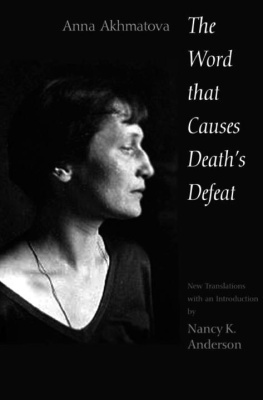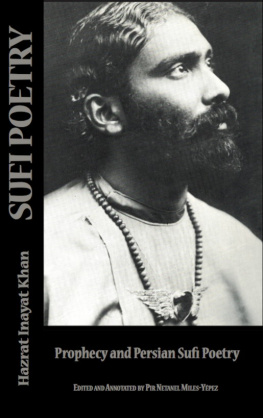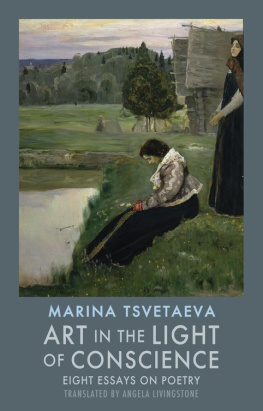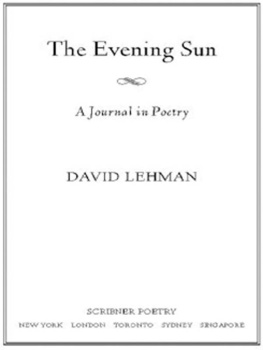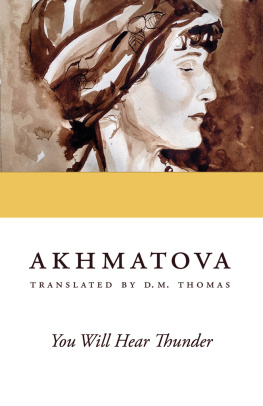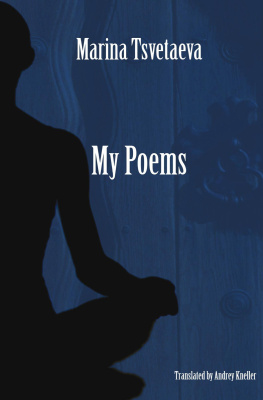Evening Poetry of Anna Akhmatova Translated by Andrey Kneller
Copyrigh t Kneller, Boston, 2013 All rights reserved
For Len a and Sasha
Table of Contents I In Tsa rskoe Selo II Deception III Alisa Added to later editions Preface to the collection Evening In Alexandria, there existed a society whose members, for a more acute and intensive enjoyment of life, considered themselves doomed to death. Their every day, every hour was premortem. Although this premortem pastime in the given society boiled down to continuous orgies, it seems to us that the very thought of premortem sharpening of perception and sensitivity of the epidermis and feeling was more than justified. After all, poets especially have to possess a sharp memory of love and wide opened eyes to the whole dear, joyous and sorrowful world, to see their full share of it and drink its every minute for the final time. You yourself know that in the minutes of extreme dangers, when death is near, in one such second we remember so much more than can present itself even in the span of a long hour, when we are in the ordinary state of mind. And these recollections come neither successive nor integral, but run against one another with a sharp and burning wave.
From this wave, now glimmer the long forgotten eyes, now a cloud in the spring sky, now someones blue dress, now a voice of a stranger passerby. These trivialities, these specific fragments of our life torment and worry us to a greater extent that we would expect, and, as if unrelated to the matter at hand, lead us accurately and correctly to those minutes, to those places, where we loved, cried, laughed and grieved where we lived. It is possible to love things, like collectors love them, or like those people attached to the sensory affection, or in the sense of sentimental souvenirs, but this is an altogether different feeling of connection, incomprehensible and inescapable, revealing itself to us now in sorrowful, now in rejoicing delight, that we reference above. It seems to us that unlike other lovers of things, Anna Akhmatova possesses an ability to understand and love things exactly in their incomprehensible connection to the experienced minutes. She often accurately and specifically mentions some object (a glove on the table, a cloud like a squirrel pelt in the sky, yellow light in the bedroom, a three-cornered hat in the park of Tsarskoe Selo), appearing to have no relationship to the whole poem, left behind and forgotten, but precisely this mention makes the prick more tangible, the poison we feel more sweet. Had this squirrel pelt been omitted, and the whole poem, perhaps, would not have such a fragile poignancy that it has.
We dont want to say that things mentioned by the author have such a special meaning every time: often they are no more than sentimental souvenirs or feelings transferred from a person onto things that belong to her. We say this not in reproach of the young poet, because it is already no small feat to compel the reader to dream, and cry, and become angry together with you, even by the means of sentimental emotionality, - but especially value that first understanding of the sharp and incomprehensible meaning of things that we do not encounter very often. And it seems to us that Anna Akhmatova has that heightened perceptibility, to which aspired the doomed to death members of the society. By this we do not wish to say that her ideas and mood always applied to death, but their intensity and sharpness is such. Let us conclude that she does not belong to the poets who are particularly merry, but to those who are always stinging. It seems to us that she is alien to mannerism, which, if she has one, is somewhat homogenous with the mannerism of Laforgue, meaning a capricious child who is accustomed to always being heard and being admired.
Among the very young poets, of course, there are others who strive for the delicate and, we would say, fragile poetry, but at the time, when some are searching for it in description of objects conventionally considered delicate: Sevres cups, fireplaces, harlequins, knights and madonnas (Ehrenburg), others in unusually refined analysis of deliberately-fanciful experiences (Mandelshtam), the third kind in ironic descriptions of intimate, somewhat demonstratively-everyday life (Marina Tsvetaeva), - it seems to us, that the poetry of Anna Akhmatova makes a sharp and fragile impression because its own perceptions are such, from herself the poet only adds a Lafoguesque, pleasant to our taste, mannerism. Vyacheslav Ivanov once expressed the thought that original poets before anything else acquire their own manner, which subsequently they renounce for the sake of their face, which in turn is brought as sacrifice to their style. From the fact that in the given situation the poet already has an established mannerism, it is easy to conclude that this poet is original and that a new female voice, different from other and audible, despite the apparent, as if desired by its possessor, weakness of tone, has joined the general chorus of Russian poets. We are not writing a critique, and our role is a rather minor one: only to announce the name and somehow present the newly arrived. We can hint slightly at her origins, indicate certain signs and voice our conjectures, - which is what we are doing. And thus, ladies and gentlemen, she comes towards us, new and young, but having all the credentials necessary for becoming a real poet.
And her name is Anna Akhmatova. 1912 M. Kuzmin I , , , , , ... . , . 1911 Love First as a serpent, itll cast its spell Next to your heart, curled up.
Then itll come as a dove as well, Cooing for days nonstop. In the frost itll show itself curtly Or in the drowsi ng field of carnations
To escort you covertly and firmly Away from all rest and elation. In the prayer of a violin yearning, So sweetly itll sob for a while, And how frightening it is to discern it In a yet unfamiliar smile. 1911 I . , , , . , , . , . 22 1911 In Tsarskoe Selo I Down the alley the horses are led, Their long wavy manes - all combed out, A place full of r iddles, how I lament, Having fallen in love with this town. 22 1911 In Tsarskoe Selo I Down the alley the horses are led, Their long wavy manes - all combed out, A place full of r iddles, how I lament, Having fallen in love with this town.
Its strange to recall: the soul pined for joy, Only gasping for breath to pull through, And now Ive become a plaything, a toy, Like my rose-colored friend cockatoo. No hint of pain can now make me cower, Look in my eyes and youll see, I dislike only the pre-sunset hour, The word leave and wind from the sea. February 22, 1911 Tsarskoe Selo II ,
,
,
.
, , ,
. 1911 II And there, my double made of marble Lies by the ancient maple tree, His face onto the lake imparted, He hears the rustling greenery. Bright showers wash in a cascade The clotted wound upon his torso O, cold one, white one, only wait And I will turn to marble also. . 24 1911 III A swarthy youth once wandered her e, By t he shores of the lake he sighed And for a century now we revere A barely audible rustling stride. 24 1911 III A swarthy youth once wandered her e, By t he shores of the lake he sighed And for a century now we revere A barely audible rustling stride.
Pine needles dense and bristly mat Covers the stumps of the trees Here lay his old three-cornered hat And a worn, tattered book by Parny. February 24, 1911 Tsarskoe Selo *** , , , , c , , . , - . . , . 30 1911 *** The boy there on the bagpipes playing, The girl who weaves herself a wreath, Two fo rest paths that cross while straying, A distant fire in the fields beneath - I see all. 30 1911 *** The boy there on the bagpipes playing, The girl who weaves herself a wreath, Two fo rest paths that cross while straying, A distant fire in the fields beneath - I see all.
Next page

